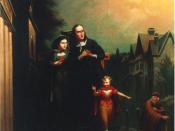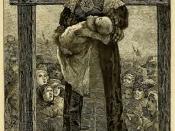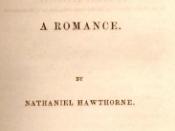Judgementalality
OJ Simpson was suspected of killing his ex-wife and her friend outside her
home. Before he was arrested for the suspicion he was already tried, convicted
and, executed in the minds of all of America. Before he went to trial everyone
knew the 'truth,' everyone had already decided his fate before the evidence
was presented. No one knew what happened but we all formed our opinions
and theories of how he did it, why he did it, and if he should be killed or just get
life in prison. Our world is too judgmental and it always has been. Even in the
time Hawthorne wrote of in The Scarlet Letter and in 'The Ministers Black Veil'
people judged before they knew the truth.
Objects were judged even though they had no relevance on what really
happened. In 'The Ministers Black Veil' no one knew why the minister wore
the veil but everyone assumed it meant shame and that he had something to
hide. I think that the minister thought that it was his mission to show how
superficial the people were. The ministers own fiancee left him because no one
knew anything about the veil he wore. Again in The Scarlet Letter, I can think
of two more major examples where an object was used as a sign or omen. The
first is of course the letter, it meant evil, shame, and sin to the townspeople.
All it was, was a letter nothing more, nothing less. The second object that
people took as a prolific sign was the weeds on a grave. They reasoned that the
weeds were there because of the sins of that person, and that the weeds grew
because flowers could not. People then and now take symbols too deeply and
meaningful.
People often take...


